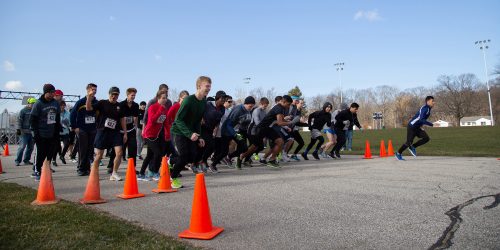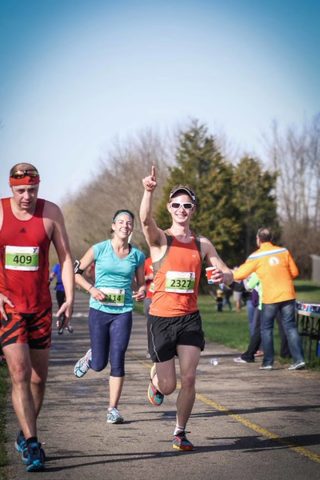

Fifty-one people, roughly ten across and five deep, stood on the blacktop track. Four fluorescent orange cones marked the right side of the starting line, and three marked the left. Under bright blue skies, Solar Run participants smiled despite the freezing temperatures — they were running for a reason.
Engineers Without Borders (EWB) is an organization that, through sustainable engineering projects, empowers communities to meet their own basic human needs. EWB has over 13,000 members throughout the United States in professional and student chapters. The Andrews University student chapter has 90 members from a variety of academic programs.
Through Joel Raveloharimisy, associate professor of Behavioral Sciences and director of the Community & International Development program on campus, Andrews’ EWB Chapter connected with a project idea.
Over the years, Raveloharimisy and student teams who participate in the Madagascar Study Tour built a school and other infrastructures in Madagascar. The electrical pieces, though, were outside of the resources available in Madagascar. The Andrews EWB Chapter heard of this need and took up the challenge.
They proposed a project to EWB headquarters that involved providing lighting — potentially solar panels — to the Madagascar school. They also demonstrated the ability to arrange finances for the project through fundraisers, donations and grants. EWB headquarters approved a five-year contract between the Andrews EWB Chapter and the Madagascar site. And Greg Zdor, then in his junior year of college and serving as the vice president of the Andrews EWB Chapter, found a new purpose for a separate aspect of his life.
Greg grew up in the Berrien Springs, Michigan, area. He and his family attended the Stevensville Church, and his dad worked as a professor at Andrews University. At age 14, Greg began riding with the St. Joseph Cycling Club as a way to stay fit. “I didn’t consider myself an endurance athlete,” he says, “but cycling jumpstarted my interest in endurance sports.”
When Greg became a student at Ouachita Hills Academy in Arkansas, there was no easy way to facilitate road biking. The academy could not allow Greg to ride 50 miles away from campus on his own, so Greg took up running.
He ran a 5K every other day and 15 to 20 miles every Friday. This was greatly encouraged by a math professor, Dillon Flannery, who would run with Greg. As they ran, they talked calculus.
In 2013, at the end of his junior year in academy, Greg ran his first marathon distance — an event witnessed by his parents and supporting academy staff and students — finishing in 3hr, 37min. In 2014, at the end of his senior year, he participated in the Little Rock Marathon with 13,000 people. Temperatures unexpectedly fell from the 50s to the 20s, and Greg was in shorts and a tank top. Despite the weather conditions, he completed the marathon and learned his time was 3hr, 07min., less than two minutes away from qualifying for the Boston Marathon. Greg was motivated to keep training.
When Greg began attending Andrews University in 2015, he started as a Biochemistry (ACS) major and J.N. Andrews Honors Scholar. He was very focused on school and phased off from his running, although he still completed the Chicago Marathon without training in 2015. In his academics, he soon learned he enjoyed math and physics more than biology and organic chemistry, so he switched his major to Electrical Engineering.
Greg grew up in a service-oriented family. He says, “I worked in the Benton Harbor soup kitchen the first Sunday of every month and participated in humanitarian projects and mission trips throughout high school. I also served in leadership roles on the yearbook staff and as a resident assistant.”
During his first two years at Andrews, though, he felt at a loss in terms of leadership opportunity. He continues, “I told my dad that I was becoming a bookworm and a physics nerd, while before I was used to leading things and carrying out events in addition to focusing on academics.” Then Greg learned about Engineers Without Borders (EWB).
In 2017, Greg organized the first EWB Andrews Solar Run 5K. He and Ester Carrasco, a Chemical Engineering major, created a website and organized strong advertising. The night before the race, Greg pulled an all-nighter to set up the route. The run was a success with 70 people registering and 49 racing. Personally, though, Greg was burned out. He got sick with a fever and realized he had taken on too much. He decided that, for his senior year, he would not serve as an officer for EWB, but, when asked, agreed to direct the 2018 Solar Run. He recalls, “I said yes on a few conditions—like doing a tenth of the work from the previous year. A lot of work this year was in delegation. It was a great process of learning how to hand off timing, race bibs, etc.”
The 2018 Solar Run — the race that took place in freezing temperatures — had 122 registrants and 51 who ran the race (some registrants chose to support the Solar Run with their registration fees only). Over $4,000 was raised to support the Madagascar project, demonstrating significant growth for the Andrews EWB Chapter.
During Greg’s sophomore year, the student chapter’s budget was approximately $300. Now, combining donations and fundraisers, it has a budget of over $20,000, largely assisting the Madagascar project but also supporting Habitat for Humanity projects in Benton Harbor.
In May 2018, members of the Andrews EWB Chapter flew with a professional engineer from the University of Nebraska to assess the Madagascar project site, a village in a remote jungle. The trip was conducted in conjunction with the Madagascar Study Tour, and the team examined whether the solar panel plan they had in place would work or if adjustments needed to be made.
Year three of the project is the implementation phase, when solar panels will be purchased. The student chapter members will do the actual installation of the panels under the oversight of a professional engineer. Depending on how the implementation phase goes, year four of the contract may continue implementation. Then, during year five, some of the team will take a trip back to Madagascar to assess design performance, perform any needed repairs, and empower the local villagers on the basics of repairing the system in case it breaks down.
Reflecting on the differences between running and engineering, Greg says, “Running and EWB have taught me different lessons. Running shows you have muscles you didn’t know you had before you started and how to handle pain and push through difficulty. EWB has taught leadership, team building, negotiation, planning, budgeting, trip coordination and networking.”
Greg also recognizes how God has connected running and engineering in his life, and how God has allowed Greg to use running for a bigger purpose. He says, “Running requires perseverance. EWB requires perseverance. My electrical engineering career demands dedication. All these traits I get from God. God’s love and grace inspire me to do my best in all things, which means I have a moral obligation to push my hardest in all.”